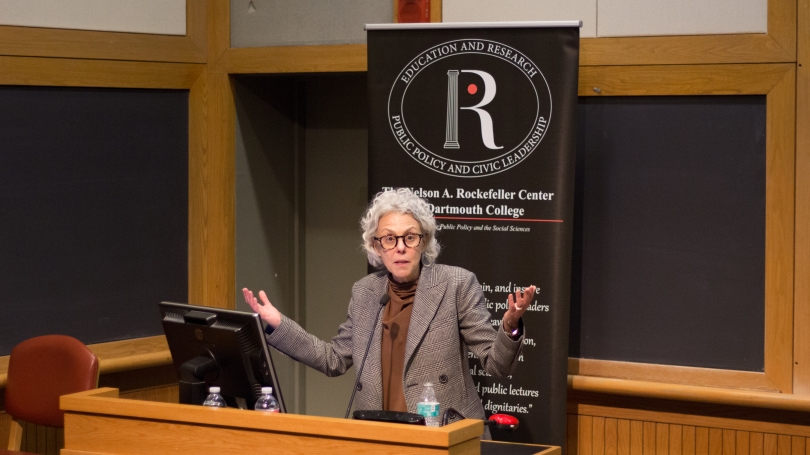
- Public Policy
- Leadership
- Funding
- News & Events
- About the Center
Back to Top Nav
Back to Top Nav
Back to Top Nav
Back to Top Nav
On Thursday, April 11, 2019, The Nelson A. Rockefeller Center for Public Policy and the Social Sciences hosted a public lecture with Ethan A. H. Shepley Distinguished University Professor Lee Epstein, who is a faculty member at the Washington University in St. Louis Center for Empirical Research in the Law. The Wiliam H. Timbers ’37 Lecture, entitled “The Evolving U.S. Supreme Court,” was co-sponsored by the Dartmouth Lawyers Association and the Dartmouth Legal Studies Faculty Group.
Prof. Epstein largely focused on how the Kavanaugh nomination will affect the ideological balance of, and decisions made by, the Supreme Court. In forming predictions, she drew on her analyses of ideological trends within the Court, as well as evaluations of the idiosyncrasies of individual Justices.
To begin, she placed each justice on an ideological spectrum, with Justice Sotomayor at the far left and Justice Thomas at the far right. Justice Kennedy, before he resigned, occupied the center of the spectrum. Chief Justice Roberts is now the centermost justice, meaning that the ideological balance of the court has shifted to the right. Justice Kavanaugh’s appointment deepened this shift, widening the gap between the ideological poles of the court.
Prof. Epstein walked the audience through three specific issues: abortion, guns, and affirmative action. These are the cases, she believes, in which the effects of Kavanaugh’s appointment will be the most evident. In terms of abortion, the Supreme Court will likely uphold states’ restrictions on abortions. She also predicts that the Supreme Court will become more involved with gun control cases, a topic which, during Kennedy’s tenure, the Court was loathe to address. And finally, she predicts that this Court will be more receptive to cases against affirmative action.
At a student lunch before the event, Prof. Epstein spoke about the judicial nomination and confirmation processes more broadly, emphasizing that the United States’ system works quite differently than the systems of other countries. Our elected officials nominate and confirm judicial appointees, our judges and justices are appointed to lifelong terms, and our Supreme Court hears only about sixty cases each year.
These structural differences, she believes, have contributed to the unusually partisan nature of our judicial system. An independent review board responsible for selecting justices would be inherently less partisan than Congress; setting a term limit or retirement age for justices would prevent them from strategically retiring during the terms of presidents who share their ideology; and increasing the number of cases the Supreme Court hears each year would draw attention away from “hot button,” divisive issues.
Though these reforms would be consistent with how judicial systems operate in other parts of the world, Prof. Epstein said that she does not foresee them happening any time soon. She urged audience members to, in the meantime, exercise their right to free assembly. The Court has neither money nor a militia and thus has very little power to enforce its decisions. It is accountable both to Congress and to public opinion. Those who are displeased with the Court’s decisions should protest, vote, and otherwise make their displeasure known.
-Written by Eliza Jane Schaeffer ’20, Rockefeller Center Student Program Assistant for Public Programs